Monday, May 27th 2019

AMD Announces 3rd Generation Ryzen Desktop Processors
AMD CEO Dr. Lisa Su at her 2019 Computex keynote address announced the 3rd generation Ryzen desktop processor family, which leverages the company's Zen 2 microarchitecture, and are built on the 7 nm silicon fabrication process at TSMC. Designed for the AM4 CPU socket, with backwards compatibility for older AMD 300-series and 400-series chipset motherboards, these processors are multi-chip modules of up to two 8-core "Zen 2" CPU chiplets, and a 14 nm I/O controller die that packs the dual-channel DDR4 memory controller and PCI-Express gen 4.0 root complex, along with some SoC connectivity. AMD claims an IPC increase of 15 percent over Zen 1, and higher clock speeds leveraging 7 nm, which add up to significantly higher performance over the current generation. AMD bolstered the core's FPU (floating-point unit), and doubled the cache sizes.
AMD unveiled three high-end SKUs for now, the $329 Ryzen 7 3700X, the $399 Ryzen 7 3800X, and the $499 Ryzen 9 3900X. The 3700X and 3800X are 8-core/16-thread parts with a single CPU chiplet. The 3700X is clocked at 3.60 GHz with 4.40 GHz maximum boost frequency, just 65 Watts TDP and will be beat Intel's Core i7-9700K both at gaming and productivity. The 3800X tops that with 3.90 GHz nominal, 4.50 GHz boost, 105W TDP, and beat the Core i9-9900K at gaming and productivity. AMD went a step further at launched the new Ryzen 9 brand with the 3900X, which is a 12-core/24-thread processor clocked at 3.80 GHz, which 4.60 boost, 72 MB of total cache, 105W TDP, and performance that not only beats the i9-9900K, but also the i9-9920X 12-core/24-thread HEDT processor despite two fewer memory channels. AMD focused on gaming performance with Zen 2, with wider FPU, improved branch prediction, and several micro-architectural improvements contributing to a per-core performance that's higher than Intel's. The processors go on sale on 7/7/2019.When paired with an AMD X570 chipset motherboard, these processors make up the world's first PCI-Express gen 4.0 based desktop platform. PCIe gen 4.0 doubles per-lane data bandwidth to 16 Gbps. The Ryzen 3000 "Zen 2" processor puts out 24 PCIe gen 4.0 lanes externally, from which 16 lanes are meant for graphics cards, 4 lanes for an M.2 NVMe slot, and 4 as chipset-bus. The X570 chipset puts out 16 downstream PCIe gen 4.0 lanes, which means up to two additional M.2 slots, and more onboard connectivity. The total platform PCIe lane budget has shot up to 40 lanes, all of which are gen 4.0. AMD put out 3DMark PCIe bandwidth feature-test performance numbers comparing a Radeon RX 5700 "Navi" graphics cards on a Ryzen 7 3800X vs. an RTX 2080 Ti a PCIe gen 3.0 platform powered by Core i9-9900K. The performance was significantly higher.Much of AMD's engineering effort with Zen 2 has been to increase the CPU core's overall math performance, which translated to higher IPC (by 15 percent), increased per-core performance, and conversely higher gaming performance. AMD put out some astonishing gaming performance numbers, in which it compared a 3800X to its own 2700X from the previous generation. You see a staggering 22 percent increase in PUBG frame-rates, and up to 34 percent increase in CS:GO. This may look like insignificant e-Sports titles as opposed to the big AAA ones, but give valuable insights to the chip's gaming prowess. We're convinced that Zen 2 will be faster than any Intel processor at gaming when it comes out.
AMD unveiled three high-end SKUs for now, the $329 Ryzen 7 3700X, the $399 Ryzen 7 3800X, and the $499 Ryzen 9 3900X. The 3700X and 3800X are 8-core/16-thread parts with a single CPU chiplet. The 3700X is clocked at 3.60 GHz with 4.40 GHz maximum boost frequency, just 65 Watts TDP and will be beat Intel's Core i7-9700K both at gaming and productivity. The 3800X tops that with 3.90 GHz nominal, 4.50 GHz boost, 105W TDP, and beat the Core i9-9900K at gaming and productivity. AMD went a step further at launched the new Ryzen 9 brand with the 3900X, which is a 12-core/24-thread processor clocked at 3.80 GHz, which 4.60 boost, 72 MB of total cache, 105W TDP, and performance that not only beats the i9-9900K, but also the i9-9920X 12-core/24-thread HEDT processor despite two fewer memory channels. AMD focused on gaming performance with Zen 2, with wider FPU, improved branch prediction, and several micro-architectural improvements contributing to a per-core performance that's higher than Intel's. The processors go on sale on 7/7/2019.When paired with an AMD X570 chipset motherboard, these processors make up the world's first PCI-Express gen 4.0 based desktop platform. PCIe gen 4.0 doubles per-lane data bandwidth to 16 Gbps. The Ryzen 3000 "Zen 2" processor puts out 24 PCIe gen 4.0 lanes externally, from which 16 lanes are meant for graphics cards, 4 lanes for an M.2 NVMe slot, and 4 as chipset-bus. The X570 chipset puts out 16 downstream PCIe gen 4.0 lanes, which means up to two additional M.2 slots, and more onboard connectivity. The total platform PCIe lane budget has shot up to 40 lanes, all of which are gen 4.0. AMD put out 3DMark PCIe bandwidth feature-test performance numbers comparing a Radeon RX 5700 "Navi" graphics cards on a Ryzen 7 3800X vs. an RTX 2080 Ti a PCIe gen 3.0 platform powered by Core i9-9900K. The performance was significantly higher.Much of AMD's engineering effort with Zen 2 has been to increase the CPU core's overall math performance, which translated to higher IPC (by 15 percent), increased per-core performance, and conversely higher gaming performance. AMD put out some astonishing gaming performance numbers, in which it compared a 3800X to its own 2700X from the previous generation. You see a staggering 22 percent increase in PUBG frame-rates, and up to 34 percent increase in CS:GO. This may look like insignificant e-Sports titles as opposed to the big AAA ones, but give valuable insights to the chip's gaming prowess. We're convinced that Zen 2 will be faster than any Intel processor at gaming when it comes out.
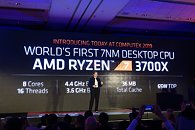
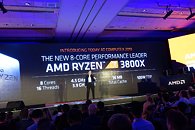
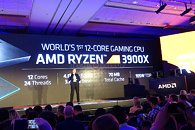
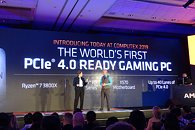


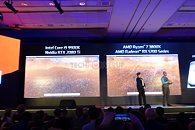
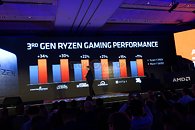
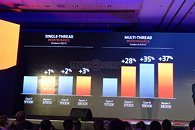
95 Comments on AMD Announces 3rd Generation Ryzen Desktop Processors
www.amd.com/en/products/specifications/processors/11781,11756,11761,11766,11771
Continued...
Worth it.
The 3800X SKU is especially pointless considering that problably every 3700X can do those clocks at 70$ less. And what's with the TDP increase? Going from 3,6/4,4 to 3,9/4,5 results in 40W extra? Makes no sense.
$199 Ryzen 5 3600 6-core/12-thread. 3.60 GHz/4.20 GHz. 65W
$249 Ryzen 5 3600X 6-core/12-thread. 3.80 GHz/4.40 GHz. 95W
$329 Ryzen 7 3700X. 8-core/16-thread. 3.60 GHz/4.40 GHz. 65W
$399 Ryzen 7 3800X 8-core/16-thread. 3.90 GHz/4.50 GHz. 105W
$499 Ryzen 9 3900X 12-core/24-thread. 3.80 GHz/4.60 Ghz. 105W
So if +2 cores costs about ~50$ to 70$ extra and +4 cores costs +100$ extra then 16 core model would cost between 599$ and 649$
Tho i feel AMD backed themselves into a corner by slapping Ryzen 9 name to 12 core parts and going straight to 3900X. This does not leave much space to fit supposed 16 core variants on top and name them differently.
This is what i think 16 core part would look like. Maybe im too optimistic about clocks. They might also go with 3990WX name to position it more like a Threadripper chip.
$649 Ryzen 9 3990X 16-core/32-thread. 4.00 GHz/4.70 Ghz. 125W
BTW. I see that a lot of people like to throw crap and laugh from somebody giving information which is presumably true and yet these people still have problem grasping what presumably means and how you should perceive it. It is really weird and laughable for me :)